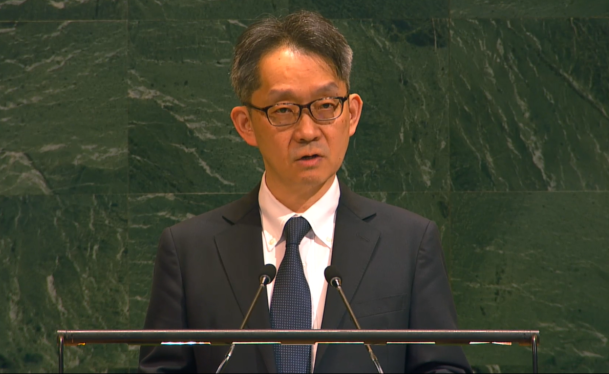Statement by H.E. Ambassador MIKANAGI Tomohiro, Deputy Permanent Representative of Japan to the United Nations, at the General Assembly Plenary Debate on the situation in Afghanistan (Item 36)
2025/7/7

(as delivered)
Mr. President,
I would like to begin by expressing our appreciation to Mr. President for convening today’s debate at this critical juncture for Afghanistan. I would also like to thank Germany for facilitating consultations on the draft resolution on the situation in Afghanistan.
Japan is proud to be a co-sponsor of this draft resolution A/79/L.100. We believe that this text covers all aspects of the challenges that Afghanistan faces in a comprehensive manner.
Since the adoption of the previous resolution in November 2022, the international community and the United Nations have striven to increase international engagement with Afghanistan in a more coherent, coordinated and structured manner. Japan has contributed to this effort proactively both on the ground through our Embassy in Kabul and here in New York.
Throughout our Security Council term in 2023 and 2024, Japan led the discussions on Afghanistan as a penholder, and facilitated the issuance of the Independent Assessment report and the adoption of Security Council resolution 2721, which affirms that our objective is to achieve an Afghanistan at peace with itself and its neighbors, fully reintegrated into the international community and meeting its international obligations. To this end, Japan has also supported the UN-led Doha Process. We welcome that these major developments are reflected in the draft resolution.
However, as the draft resolution illustrates, Afghanistan continues to be confronted with a myriad of issues. The social, economic and humanitarian situation in Afghanistan remains dire. Significant deprivations of rights and freedoms persist. Terror attacks continue to occur sporadically. The country’s challenges are compounded by natural disasters and climate change as well as the mass return of Afghan citizens from its neiboring countries. Among others, Japan is especially concerned about the restrictive measures imposed on women and girls. As we approach four years since the Taliban’s takeover, it is unacceptable that the window for higher education remains closed to them.
While we acknowledge some progress made by the Taliban, including in the areas of security and counter-narcotics, the country’s multifaceted issues cannot be addressed by Afghanistan or its neighbors alone. Nevertheless, the lack of progress on human rights issues limit the scope for international engagement and assistance.
Therefore, Japan once again urges the Taliban to swiftly reverse its repressive policies. This is not solely about human rights. It also severely undermines the potential of Afghanistan’s prosperity as well as international engagement and confidence-building efforts. While we welcome that the latest Working Groups were held in-person in Doha last week, whether this process will lead to full-fledged international assistance hinges on the Taliban side’s actions.
Despite this difficult situation, Japan will not cease its engagement with Afghanistan nor its support for the Afghan people. As international aid to Afghanistan continues to decline, we believe it is important to move beyond humanitarian assistance to provide basic human needs support and economic empowerment for the self-reliance and sustainable growth of the Afghan people. From this perspective, Japan has placed livelihood support at the center of its efforts, with a particular focus on supporting women entrepreneurs and female workers. Through our program, “Project for Strengthening Women's Economic Activity in Private Sector,” a 10 million USD initiative implemented by UNDP in collaboration with Japan’s aid agency, JICA, we are providing capacity building and financial support to 1400 Afghan women-led businesses.
Japan is sincere in its desire to help alleviate the suffering of the Afghan people, and we will remain steadfast in our efforts to improve the situation in the country. I would like to close my statement by expressing hope that this draft resolution will send a strong signal of support to the Afghan people.
I thank you, Mr. President.
